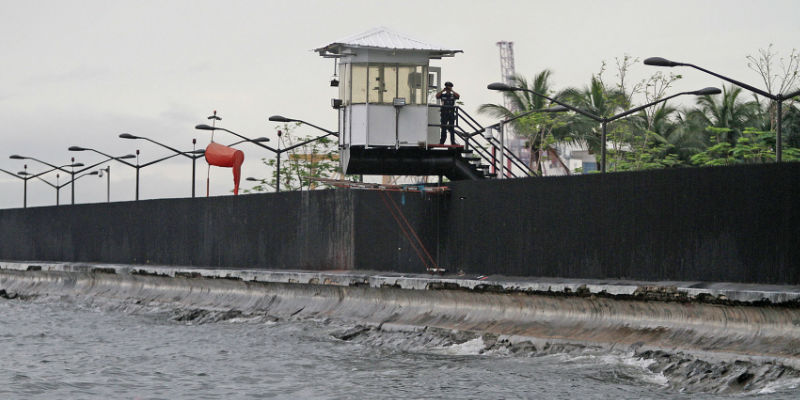
HEAVY SECURITY With a pair of binoculars, a guard surveys the surroundings of the US Embassy in Manila from a newly constructed outpost protruding over the wall. Security was increased at US embassies and consulates around the world following an attack that killed the US ambassador in Libya. RICHARD A. REYES
Despite spreading anti-American violence, Malacañang is not taking steps to block the anti-Islam video “The Innocence of Muslims” in the Philippines.
The police, however, have stepped up security around the US Embassy on Roxas Boulevard, Manila, in anticipation of local protests against the video.
Even the Moro Islamic Liberation Front (MILF), the largest Moro insurgent group in the country, is not taking action to protest the video. On Sunday, it rejected a call from the international terrorist network al-Qaeda to attack US targets over the video.
Ghazali Jaafar, MILF chief political officer, said the group had instructed its 12,000 members to observe a ceasefire agreement with the government, and not to attack US interests in the country.
Online access
“We do not live in the dark ages, there are rules and laws that need to be followed,” Jaafar told Agence France-Presse. “We have an existing ceasefire with the Philippines, and we will not violate that.”
“Even in war, there are international norms that need to be accepted, including the protection of diplomats and embassies,” he said.
Communications Secretary Herminio Coloma on Sunday said the government would not ask YouTube to block online access to the video in the Philippines.
“There are neither precedent nor existing conditions that may prompt us to consider moving in that direction,” Coloma said in a text message.
YouTube parent company Google has decided to block access to the video in Libya and Egypt as a compassionate step to stem anger in the Muslim world over the incendiary film.
“The Innocence of Muslims,” previously titled “The Innocence of Bn Laden,” is an anti-Islamic film made by American producer Sam Bacille, whose real name is Nakoula Basseley Nakoula. It depicts the Prophet Muhammad as a buffon, a womanizer and a child molester. It was directed by softporn filmmaker Alan Roberts, whom Nakoula reportedly hired without telling him he was directing a piece of anti-Islamic propaganda.
Spreading protests
The film was shown once in a Hollywood theater, then two trailers were released on YouTube in July. The trailers were dubbed into Arabic, then spread by Egyptian-American blogger Moris Sadek, a Coptic Christian.
A two-minute excerpt from the trailer was broadcast in Egypt on September 2, sparking violent protests in Cairo.
The protests spread to Libya, Yemen and other Arab and Muslim nations over the following days.
On September 11, the 12th anniversary of the al-Qarda attacks on New York and Washington, the protests in Benghazi, Libya, turned deadly, with an armed group launching an attack on the US Consulate there. US Ambassador to Libya J. Christopher Stevens and three American members of his staff were killed in the attack.
Coloma said the government was watching out for similar threats to Philippine security.
He said government security forces could neutralize any attempt at violence over the video.
Communications Secretary Ricky Carandang said as much in a separate text message.
“I trust that viewing it will not fill you with hatred for America,” Carandang said, probably thinking he was answering a question from a Muslim reporter.
Freedom of expression
A third Palace official on Sunday said the government could not block the video because the Internet was covered by the freedom of expression.
“A lot of videos may be considered offensive by some sectors, but that’s also part of free speech,” deputy presidential spokesperson Abigail Valte said in a radio interview.
Valte said the National Capital Region Police Office had already upgraded security around the US Embassy in Manila, although there were “no specific threats” against Americans and other Westerners in the Philippines.
“The envoys and the US embassy personnel here in the Philippines do not need to flee because our Muslim community has always conducted themselves with goodwill and sobriety. So there’s no need to flee. There’s no danger [to] them here in Manila,” Valte said.
She said the tighter security around the US Embassy was the government’s response to US President Barack Obama’s order to US diplomatic missions to increase security amid spreading threats of violence against Americans. With reports from AP and AFP